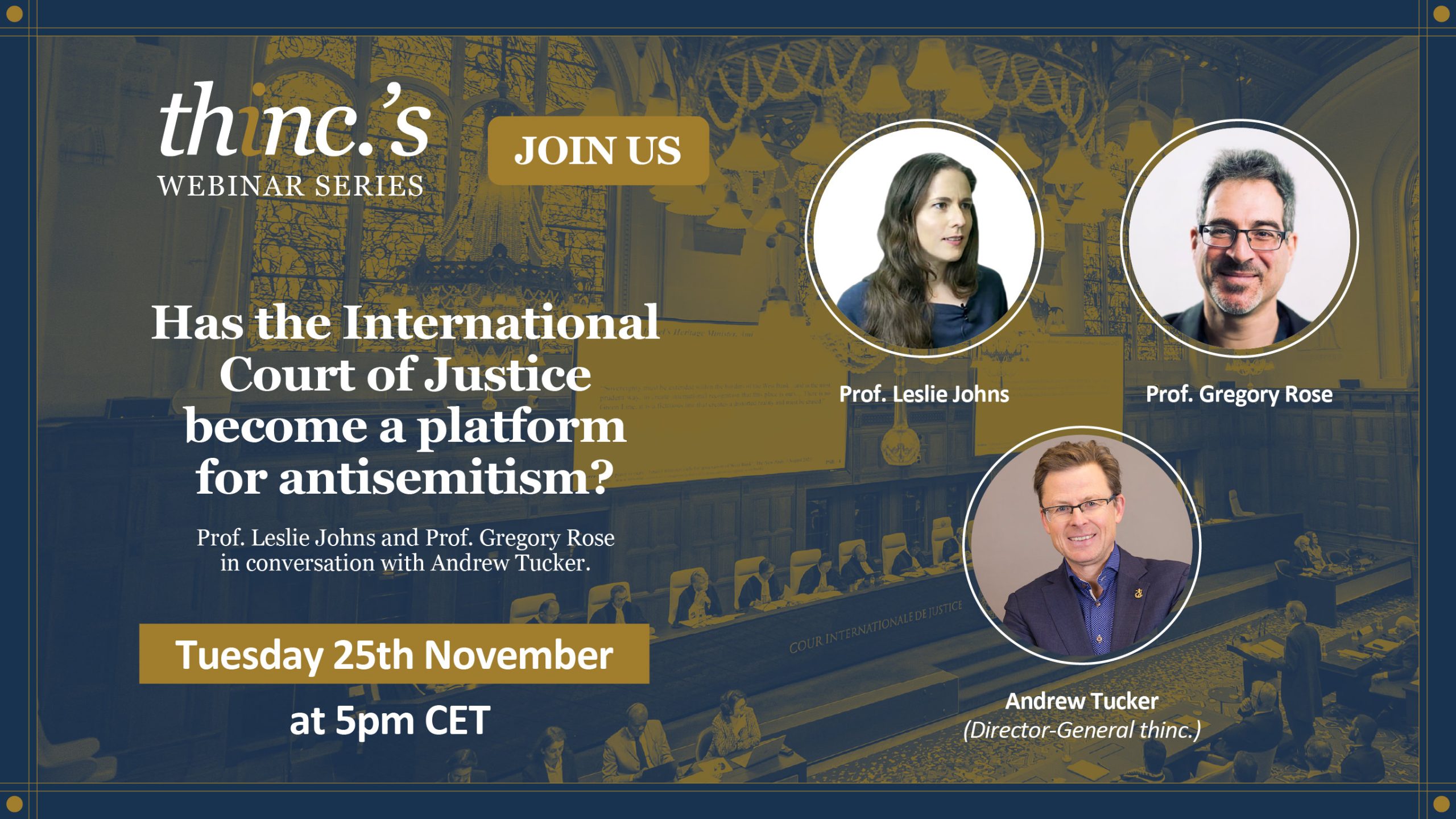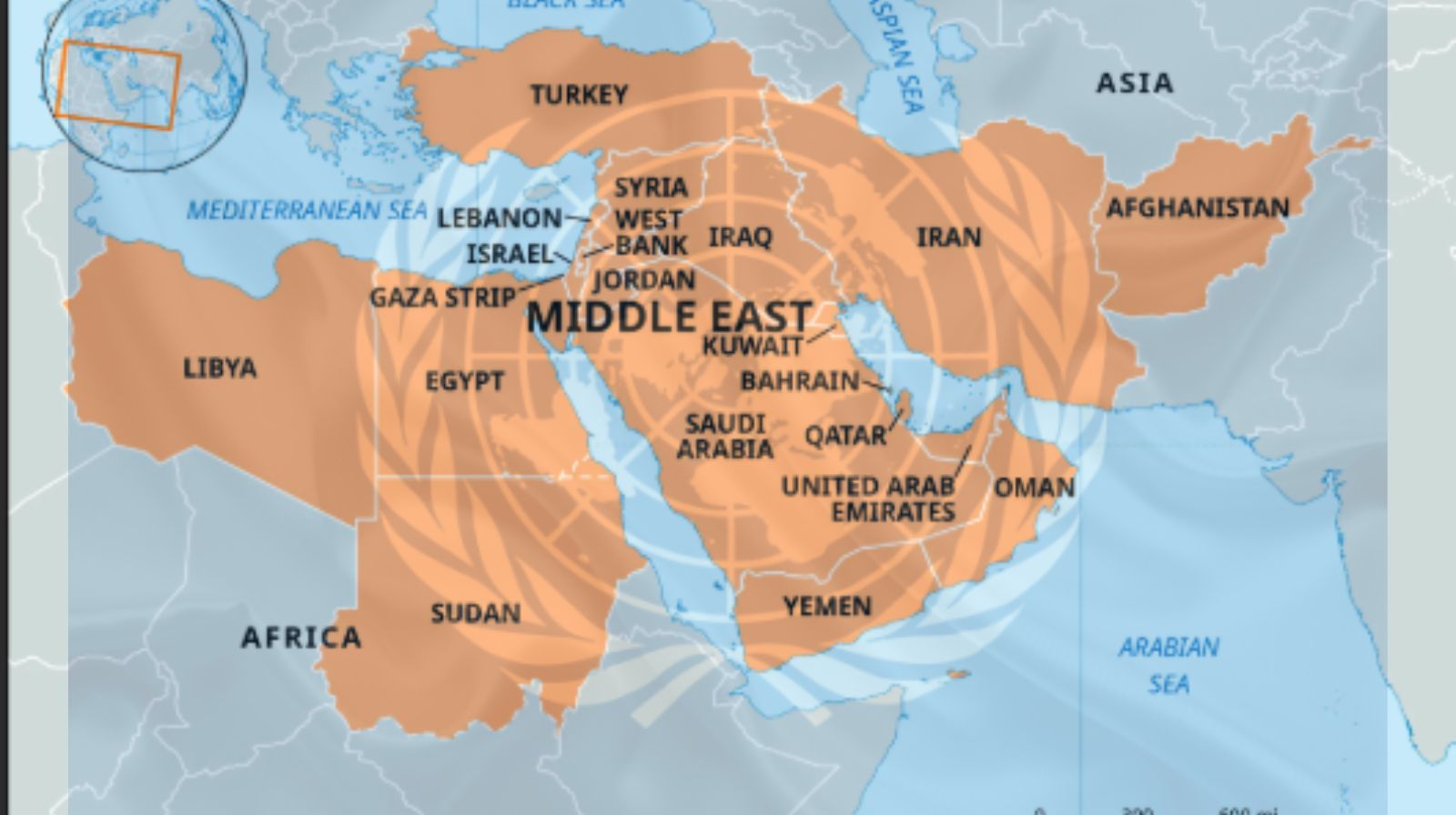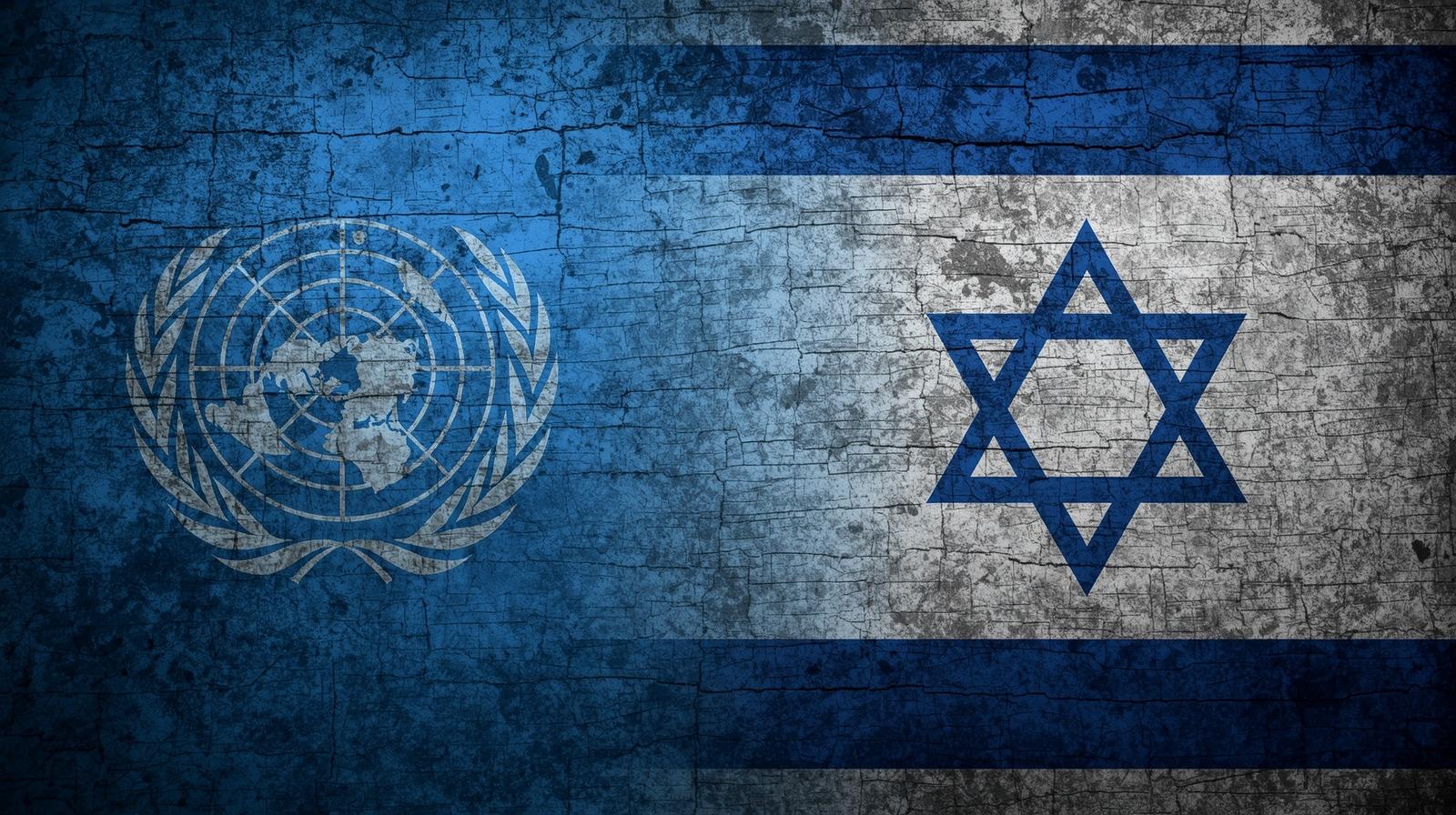By Andrew Tucker, Director, thinc.
Introduction
A specific trend can be observed in the political developments around Israel over the past few years, with an increased focus on Jerusalem. This was triggered when in 2017 President Trump announced that the USA acknowledges Jerusalem as the capital of the State of Israel, and that the USA would move its embassy in Israel from Tel Aviv to Jerusalem. The announcement, and the subsequent physical move of the US embassy in 2018, provoked international outrage.
Consequences of the Increased Focus on Jerusalem
Since then, many states are considering the question whether it is permissible under international law to move their embassies to Jerusalem. For example, Australia carried out a review on this question in late 2018 (albeit coming to questionable conclusions which appear to have been driven largely by political concerns rather than sound legal analysis). And some have either moved or are planning to move their embassies in Israel (back) to Jerusalem.
At the same time, there seems to be an increasing amount of criticism in the various UN institutions about Israel’s conduct in East Jerusalem and the other so-called “occupied” territories.
Jerusalem is also the subject of proceedings before both the International Court of Justice (ICJ) and International Criminal Court (ICC) in The Hague. This blog is about the first of those cases. It is a bizarre case, in which the Palestine Liberation Organization (PLO) appears to be trying to rewrite history, and to have that historical revisionism confirmed by the most eminent jurists in the world.
In late 2018, the ‘State of Palestine’ commenced proceedings at the ICJ in The Hague against the USA, claiming that the USA’s recognition of Jerusalem as capital of Israel and its move of its embassy in Israel to Jerusalem is contrary to international law.
Palestine (or the ‘State of Palestine’ as the party calls itself – I will use the term Palestine without inverted commas) claims, essentially, that (a) Palestine is a ’state‘ having the right to submit a case for determination by the ICJ; (b) it has a dispute with the USA that the court should decide on; and (c) the USA’s embassy move is contrary to the Vienna Convention on Diplomatic Relations because Jerusalem is not located within the State of Israel. It relies on international law on each of these issues.
One of the Most Significant Cases the ICJ Has Ever Considered
The ICJ is the most important international judicial institution in the world, and the case promises to be one of the most significant cases the Court has ever had to consider.
Palestine submitted its Memorial to the Court, substantiating its case, in May 2019. In November the USA is required to do the same. So far the USA has indicated clearly that it will not participate in the proceedings: it does not recognize the existence of the ‘State of Palestine’, or consider itself in a treaty relationship with Palestine, and refuses to recognize that the Court has jurisdiction to hear the case. It remains to be seen whether the USA will submit a Memorial, and, if not, how the Court will respond.
In the months after November 2019, and following oral submissions (probably early 2020), the ICJ will decide whether it has jurisdiction to hear the case. The main issue here is whether Palestine is a ‘State‘ for the purposes of the Statute of the ICJ, though there are other arguments the Court will also need to consider in order to decide that it should hear the case (for example, it is likely the Court will have to consider the argument that it does not have jurisdiction because a decision in the case will necessarily involve deciding on the rights and obligations of a non-party, i.e. Israel – the so-called “Monetary Gold” doctrine).
If the ICJ decides that the case is admissible and the Court does in fact have jurisdiction, it will proceed to look at the substantive issue of the status of Jerusalem under international law.
Palestine’s Three Main Arguments
Palestine relies on three main arguments to establish that Jerusalem does not fall within the territorial sovereignty of the State of Israel:
- Jerusalem is a corpus separatum (i.e. international city) pursuant to Resolution 181 (II) of the General Assembly (the UN ‘Partition Plan’);
- Pursuant to the international law principle that it is inadmissible to acquire territory by force, Israel’s seizing of control over East Jerusalem in the Six Day War, constituting an act of force, did not effect a transfer of sovereignty of the seized territory to the State of Israel; and
- As an “occupying power” since June 1967, Israel is forbidden under the international law of belligerent occupation to change the status of the occupied territory.
The primary argument that Palestine makes about Jerusalem is that Jerusalem is an international city (corpus separatum), pursuant to the 1947 UN Partition Plan. It is hard to believe that this argument will succeed. The ‘Partition Plan’ was a resolution adopted by the General Assembly on 29th November 1947. The resolution contained a proposal to the Security Council and the parties. It was rejected outright by the Arabs, and it was also never adopted by the Security Council. The whole idea of an “international city of Jerusalem” never took off, and gradually died by the early 1950’s.
In effect, the Palestinians are trying to resurrect a proposal that they themselves (in concert with the whole Arab world) rejected in 1947.
The other arguments raised by Palestine are more complicated, particularly its reliance on the many UN Security Council resolutions since 1967 condemning Israel’s annexation of East Jerusalem. Those resolutions (such as UNSC resolutions 476 and 478 in 1980) state that Israel’s effective annexation of East Jerusalem is contrary to international law. Palestine will need to demonstrate that the result of those resolutions is that Jerusalem is not part of Israel. That will be difficult, given that the Security Council has no jurisdiction or power to determine territorial borders, and in any event all of these resolutions were adopted under Chapter VI of the UN Charter. Chapter VI resolutions are not binding. Only Chapter VII resolutions are binding as a matter of law on UN Member States.
Moreover, the resolutions ignore completely the legitimacy of the Israeli claims on the whole of Jerusalem, based on the San Remo resolution (1920), the Mandate for Palestine (1922) and Article 80 UN Charter, and the principle of uti possidetis iuris.
This is a very curious case, and it would seem to be rather far-fetched. The US embassy in Israel is located in West Jerusalem. (It appears that part of the plot on which the embassy is located is in what was between 1949 and 1967 ‘no-man’s land’, but that is irrelevant for the purposes of this analysis.) This means that Palestine must prove that not only East Jerusalem but also West Jerusalem is not located in Israel. On their face, the Security Council resolutions do not seem to support that conclusion. The many UN Security Council resolutions adopted since 1967 objecting to the reunification of Jerusalem would appear to be based on the view that Israel’s seizing of territory during the Six Day War (June 1967), and its subsequent control of that territory, is contrary to the prohibition under international law of the acquisition of territory through the use of force. Even if that view is correct (which in itself is questionable – Israel was acting defensibly in June 1967), it does not affect the status of West Jerusalem.
Using the International Legal System to Achieve Political Objectives
Because Israel is itself not a party to the proceedings – the case is between the ‘State of Palestine’ and the USA – it also raises very important issues about the ‘use’ of the international legal system to achieve political objectives, which could undermine the territorial integrity and sovereign equality of the State of Israel.
In 2004, in its Wall Advisory Opinion, the ICJ allowed itself to become embroiled in a politically-motivated process in the UN General Assembly to condemn the security fence that Israel had constructed to protect its citizens from terror. In the process the Court made very influential (and arguably ultra vires) remarks about such issues as Israel’s right to self-defence, the status of the “occupied” territory, and the legality of Israeli settlements in those territories. Those statements have been very influential since 2004, and have assisted the Palestinians in their ambit claim to sovereignty over all of the “post-1967” territories, thereby in effect by-passing its obligations to negotiate under the Oslo Agreements. No doubt, the Palestinians will be hoping the ICJ will make similarly influential determinations in this case.
This ‘use’ of the ICJ to press its political case is a deliberate strategy the PLO is very open and honest about. In an Op-ed published in the New York Times in 2011, PLO Chairman Mahmoud Abbas stated very clearly that the PLO would actively seek to take legal proceedings in the ICJ to achieve its political ambitions, namely an independent State based on the so-called “1967 lines”:
“Palestine’s admission to the United Nations would pave the way for the internationalization of the conflict as a legal matter, not only a political one. It would also pave the way for us to pursue claims against Israel at the United Nations, human rights treaty bodies and the International Court of Justice. … We call on all friendly, peace-loving nations to join us in realizing our national aspirations by recognizing the State of Palestine on the 1967 border and by supporting its admission to the United Nations. Only if the international community keeps the promise it made to us six decades ago, and ensures that a just resolution for Palestinian refugees is put into effect, can there be a future of hope and dignity for our people.”
Another word for this is ‘lawfare’, and the Palestine vs USA case should be seen as no more and no less than the implementation of this strategy.
The ICJ should not allow itself to become the platform for non-State organizations like the PLO to achieve their political objective of being recognized as a State and obtaining international recognition of its borders. The process towards achieving autonomy and independence for any people group, and certainly the Palestinians, is a very delicate and complicated political process. Granted, the Palestinians are frustrated by Israel’s seeming intransigence. But nevertheless, the right of peoples to self-determination cannot be allowed to infringe the sovereignty of existing states. And that is exactly what could happen here. Because Israel is not a party to these proceedings, it will have no opportunity in this case to present its concerns or conditions. One of the most important of those conditions is that Israel demands secure and defensible borders, and requires assurance that an independent ‘State of Palestine’ will not be used as a launching pad for hostile attacks on the territory and citizens of the State of Israel. In light of its experience in the Gaza Strip, that is a very real concern.
In effect, the PLO is using the ICJ to by-pass the admittedly difficult, but nevertheless vitally essential, process of negotiation that is part and parcel of achieving independence, and to which in any event the PLO committed itself under the Oslo agreements.
Conclusion
With the greatest respect for the ICJ, it is simply not the appropriate forum for the assessment and determination of the many complex issues that are involved in the Israeli-Palestinian negotiations.
Despite the tenuous nature of the Palestinian claims, it is not at all certain that the ICJ will dismiss the case. On the contrary, there is a real risk the Court will decide the case is admissible, and go on to consider the Palestinians’ tenuous substantive claims.
Given the significance of the issues raised by this case, thinc. has put together a team of experts to consider the factual and legal issues raised in this case in more detail. Our plan is to publish a significant paper later this year, examining the international law issues raised by this case, including the status of the ‘State of Palestine’, and the legal status of Jerusalem. The paper will be the theme of an international conference we plan to organize in early 2020 around its publication.
Click here to download a pdf version of this blog.



